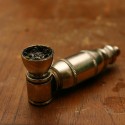FTC, Florida Attorney General Charge Promoters of Bogus Alcohol Cure
The Federal Trade Commission is suing a company that touted a phony cure for alcoholism, charging that it tricked hundreds of problem drinkers into paying hundreds or thousands of dollars for a service prescribing ineffective concoctions of natural supplements, and then threatened to reveal the drinkers’ alcohol problems if they canceled their memberships.
Filed jointly with the state of Florida in federal district court, the complaint alleges that the company lured consumers with deceptive claims about its “Permanent Cure” program. Then, when consumers tried to cancel their memberships, the company made unauthorized charges to their PayPal and credit card accounts. The complaint also alleges that the company responded to members’ attempts to cancel by rejecting the cancellations, threatening to disclose their personal information, and even revealing their alcohol dependence publicly.

You don’t have to be a victim to your alcohol addiction anymore.
The Jacksonville, Florida-based Alcoholism Cure Corporation, doing business as the Alcoholism Cure Foundation, and its sole owner deceptively peddled their program online since at least 2005, according to the complaint. Using several Web sites, the defendants advertised that their program “cures alcoholism while allowing alcoholics to drink socially” and “is scientifically proven to cure alcoholism.” They also claimed that the program – which relied on concoctions of dietary supplements such as vitamin C, St. John’s wort, and niacin – had the “best technology to end alcohol abuse permanently.” Referring to the company’s owner, Robert Douglas Krotzer – who is not a doctor – as “Dr. Doug,” the ads falsely boasted that the company had a “team of doctors” with expertise in addictive diseases, and that the doctors would create customized cures, according to the complaint.
The complaint also charges the company and Krotzer with having falsely claimed that their program was “virtually free,” that members were monitored by trained professionals, that members’ personal information and health details would be kept private, and that membership could be cancelled at any time.
The defendants pitched monthly subscriptions for either the Heavy Drinker program ($59.96 for the first month and $179.96 per month thereafter) or the Very Heavy Drinker program ($99.96 for the first month and $269.96 per month thereafter). Sales totaled at least $693,000 between 2005 and 2009, according to the complaint. When consumers tried to cancel, the company referred them to an indecipherable terms-and-conditions page and refused to cancel their memberships unless they submitted “Proofs of Continued Drinking,” including hair and blood samples, liquor receipts, notarized statements from friends and doctors, and laboratory test results. When consumers kept trying to cancel, the defendants claimed they were owed amounts ranging from $9,000 to $20,000. The complaint also alleges that the company and Krotzer threatened members with “unwanted publicity” about their alcohol addiction, and in some cases followed up by disclosing it to PayPal, credit card companies, the Better Business Bureau, Florida small claims court, and the debt collectors they hired to collect the bogus debts.
The Commission vote authorizing the complaint against the Alcoholism Cure Foundation and Krotzer was 4-0. The complaint was filed in the U.S. District Court for the Middle District of Florida, Jacksonville Division, on March 29, 2010.
source: http://www.ftc.gov
